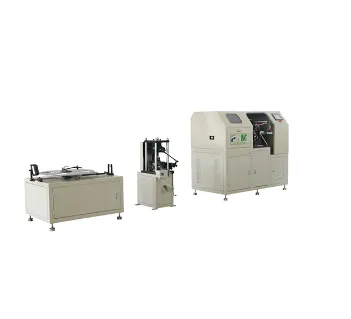Jul . 18, 2025 10:39 Khutlela lethathamong
Energy-Saving Innovations in Spin-On Oil Filter Machine Design for Sustainable Manufacturing
The automotive industry’s pivot toward sustainability has made energy-efficient manufacturing a cornerstone of modern production. For Spin-On Oil Filters, which are critical to engine longevity and performance, this shift demands reimagining how Spin-On Oil Filter Production Lines, Spin-On Oil Filter Machines, and related systems operate. By integrating advanced automation, renewable energy compatibility, and circular material practices, manufacturers can reduce energy consumption while maintaining high output. This article explores groundbreaking innovations in machinery design that align Spin-On Oil Filter Producing Machines and Spin-On Oil Filter Making Machines with global sustainability goals.

Redesigning the Spin-On Oil Filter Production Line for Energy Efficiency
The Spin-On Oil Filter Production Line is undergoing transformative upgrades to minimize energy waste and maximize resource utilization. Central to this redesign is the adoption of closed-loop systems that recover and reuse materials like metal shavings, excess polymers, and lubricants. For instance, scrap steel from stamped filter casings is magnetically separated and melted into new feedstock, reducing reliance on virgin materials by up to 40%.
Energy recovery technologies are also critical. Heat exchangers installed in curing ovens capture waste thermal energy, repurposing it to preheat incoming raw materials or power adjacent stages of the Spin-On Oil Filter Production Line. Additionally, water-based adhesives and coatings replace solvent-based alternatives, slashing volatile organic compound (VOC) emissions and simplifying recycling processes. These changes not only lower energy bills but also align with stringent environmental regulations.
Intelligent Spin-On Oil Filter Machines: Automation and Energy Recovery
Modern Spin-On Oil Filter Machines leverage smart technologies to optimize energy use without compromising precision. Electrically driven systems, such as servo-powered pleating units, have replaced pneumatic actuators, cutting energy consumption by 35–50%. These machines incorporate regenerative braking systems that convert kinetic energy from conveyor stops into reusable electricity, further reducing grid dependence.
A standout innovation is the integration of AI-driven quality control. Cameras and sensors inspect Spin-On Oil Filters in real time, identifying defects like uneven sealing or material inconsistencies. This reduces rework rates and prevents energy waste on flawed products. Machines also feature adaptive power modes, scaling energy use based on production demand. For example, during low-output periods, non-essential components enter sleep mode, conserving energy without disrupting workflows.
Retrofitting Spin-On Oil Filter Producing Machines for Sustainable Material Use
Legacy Spin-On Oil Filter Producing Machines are being retrofitted to handle eco-friendly materials such as recycled aluminum and bio-based polymers. Upgrades include precision heating elements that maintain lower temperatures for biodegradable plastics, preventing degradation during molding. Diamond-coated cutting blades are now standard for processing recycled metals, which often contain impurities that accelerate wear on traditional tools.
Self-cleaning mechanisms further enhance sustainability. Ultrasonic modules vibrate residual particles from dies and molds, eliminating chemical solvents and reducing water consumption. Lubricants derived from plant oils are used in Spin-On Oil Filter Producing Machines, ensuring spills degrade harmlessly. These retrofits extend machinery lifespan by 20% while enabling the use of up to 60% recycled content in Spin-On Oil Filters.
Modular Spin-On Oil Filter Making Machines: Flexibility Meets Efficiency
The Spin-On Oil Filter Making Machine is evolving into a modular system that supports rapid reconfiguration for diverse product specifications. Quick-swap modules allow manufacturers to transition between filter sizes or materials—like switching from steel to carbon-fiber-reinforced casings—in under 30 minutes. This agility reduces idle time and energy waste associated with maintaining multiple dedicated lines.
A key innovation is the use of QR code tagging systems within Spin-On Oil Filter Making Machines. Each filter is labeled with a code detailing its material composition, streamlining recycling by enabling automated sorting. Machines also employ low-temperature curing zones for bio-resins, which require 50% less energy than traditional epoxy systems. Such designs ensure that sustainability is embedded at every production stage.
FAQS:About Energy-Efficient Spin-On Oil Filter Manufacturing
How do energy-efficient Spin-On Oil Filter Production Lines reduce operational costs?
Closed-loop material recovery and heat exchangers cut raw material and energy expenses. Automated sorting systems also minimize labor costs associated with waste management.
What role do Spin-On Oil Filter Machines play in lowering carbon emissions?
Electric actuators, regenerative braking, and renewable energy compatibility reduce reliance on fossil fuels. AI optimization further prevents overproduction and material waste.
Can Spin-On Oil Filter Producing Machines handle recycled aluminum effectively?
Yes, retrofitted diamond blades and impurity-tolerant extruders process recycled metals without compromising precision or machine longevity.
How do modular Spin-On Oil Filter Making Machines improve manufacturing agility?
Quick-swap components allow rapid shifts between materials and designs, eliminating downtime and energy waste from recalibrating entire lines.
Are sustainable materials in Spin-On Oil Filters as durable as traditional ones?
Advanced composites and bio-resins meet or exceed OEM durability standards while reducing environmental impact. Recycled metals undergo rigorous testing to ensure structural integrity.
By reengineering Spin-On Oil Filter Production Lines and embracing intelligent Spin-On Oil Filter Machines, the industry is proving that sustainability and efficiency are not mutually exclusive. Innovations in Spin-On Oil Filter Producing Machines and Spin-On Oil Filter Making Machines demonstrate how modularity, automation, and material science can coalesce to create a greener manufacturing paradigm. As energy costs rise and regulations tighten, these advancements position manufacturers to lead in the era of sustainable automotive engineering.
-
Optimizing Truck Air Filters Machine Production Line for Cost-Efficiency and Sustainability
LitabaJul.18,2025
-
Modular Eco Oil Filter Production Line Solutions for Scalable and Flexible Output
LitabaJul.18,2025
-
Innovations in Cabin Air Filter Machine Design for Sustainable Material Processing
LitabaJul.18,2025
-
Energy-Saving Innovations in Spin-On Oil Filter Machine Design for Sustainable Manufacturing
LitabaJul.18,2025
-
Circular Economy Strategies in Toyota Air Filter Production Line Management
LitabaJul.18,2025
-
Advancing Car Air Filter Making Processes with High-Efficiency PP Material Integration
LitabaJul.18,2025
